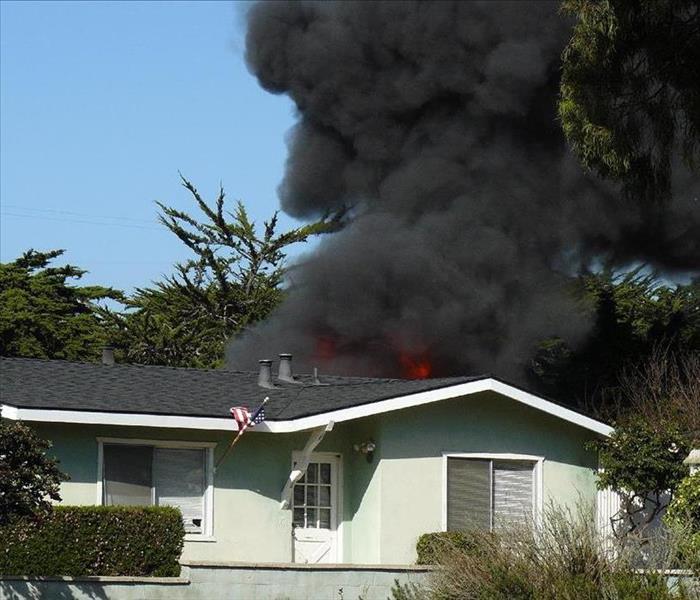What Should I Do After a House Fire?
5/17/2021 (Permalink)
A house fire is an emotionally gut-wrenching experience, no matter what size the fire is. From smoke damage and unhealthy air quality to the loss of belongings that may be precious or important, there are a lot of issues that can stem from a disaster of this kind. Even a small grease fire in the kitchen can require plenty of clean-up, not just in the kitchen, but throughout the whole house. Emotional stress is yet another challenge, and it can leave you with a sense of confusion that can be hard to overcome; you could find yourself saying “What should I do?” after a house fire.
WHERE TO BEGIN
The most important thing to do after a fire of any size is to have your home inspected for safety. There may be unseen damage to electrical wiring, wall supports, and other structural elements that need to be addressed before completing the cleaning and finishing cosmetic touches. The inspection may be conducted by a professional restoration company, and they can also give you estimates as to recovery, as well as help you to navigate the insurance portion.
PPE
Once your home is cleared as safe to enter, you still need to take precautions before stepping inside to document the damage. Adults should be wearing close-toed shoes, long-sleeved shirts and long pants, safety glasses, work gloves, and face masks. Children should be kept clear of the areas of damage entirely.
DOCUMENTATION
If possible, take pictures or videos to record the damage. If you do any repair yourself, be sure that you have proof (before-and-after) on hand for the insurance claim portion. Warranties can be negated if they require that something is repaired by a certified professional.
CLEANING
To remove soot from interior walls, cabinets, wood/metal furniture, and floors, mix a solution of two tablespoons dishwashing soap, four to six tablespoons trisodium phosphate, and one cup bleach with one gallon of warm water. Start at the top of the wall or area to be cleaned and sponge-wash one small area at a time. Rinse each section with clear water immediately and allow the surface to air dry. Bleach will help reduce the chance of mold and mildew growth. Do not repaint walls and ceilings until they are completely dry.
If the damage is extensive, the best choice may be a professional restoration cleaning company like SERVPRO. We can remove excess water, heavily damaged wood, and building materials.
For small fires, open your windows and bring in fans to help increase air circulation. For flooding, pull out all wet vinyl flooring, carpets, and carpet padding; these will need to be disposed of properly. Remove all wet items to a garage or storage area for further inspection or cleaning so you can tackle the interior repairs.
Smoke odors can linger for months and may have been trapped in the attic and wall insulation. Once the clean-up and renovation are complete, if you still detect a smoky odor, consider calling a professional restorer who may use a chemical fog to penetrate walls and insulation to neutralize the smoky smell. A thorough cleaning of the HVAC ductwork will also help reduce recurring odors.
SMOKE AND SOOT REMOVAL
If your upholstered furniture is saturated with water and you want to save the wooden frame, the fabric and padding should be stripped to prevent the growth of mold and mildew. Wooden components will need to be cleaned with a good furniture cleaning product.
Carpets that are not wet but soot-stained should be cleaned by a professional cleaning service that can employ chemical cleaners to combat the inevitable smoke odors in the carpet and padding.
Take any clothes that are labeled “dry clean only” to a professional dry cleaner and request that they treat these items to remove smoke odors. For washable fabrics affected by soot, wash as recommended on the care label with a heavy-duty detergent, and the appropriate bleach - oxygen-based is best. If stains remain, mix a new solution of oxygen bleach and warm water and soak the stained items for several hours or even overnight, and then wash again. For those fabrics that are not stained, you can just add a cup of baking soda to the final rinse cycle to remove that smoke odor. Again, soaking will help here if the smell lingers.
Place books and papers that smell smoky in a large, sealable plastic container and add a powdered odor eliminator; seal the container for at least 48 hours. Remove the books and see if the odor remains. If it does, then reseal the container for a few more days. For documents and other paper items that have been severely damaged, you can employ the services of a professional restoration company.
ITEMS TO BE DISCARDED
- Perishable and Non-Perishable Food
- If the electricity has been off for more than four hours, most refrigerated and frozen food should be discarded. If a freezer is full and undamaged, you may be able to salvage the food for up to eight hours.
- Any foods that have been exposed to heat and chemicals used in fighting the fire should be tossed. Excessive heat can cause food to spoil.
- Cosmetics and Medicines
- Water, smoke, firefighting chemicals, and high temperatures can ruin cosmetics and medicines.
- Electrical Equipment
- No electrical items like small appliances or entertainment equipment should be used until they have been checked by a professional remediation company for water damage and heat damage to wiring.
SERVPRO of North Nashville is here to help you with any disaster, no matter the size. We’re experts in fire damage, water damage, mold remediation, biohazards, vandalism, and more. We can get your home or business Certified: SERVPRO Cleaned! This franchise is independently owned and operated.





 24/7 Emergency Service
24/7 Emergency Service
